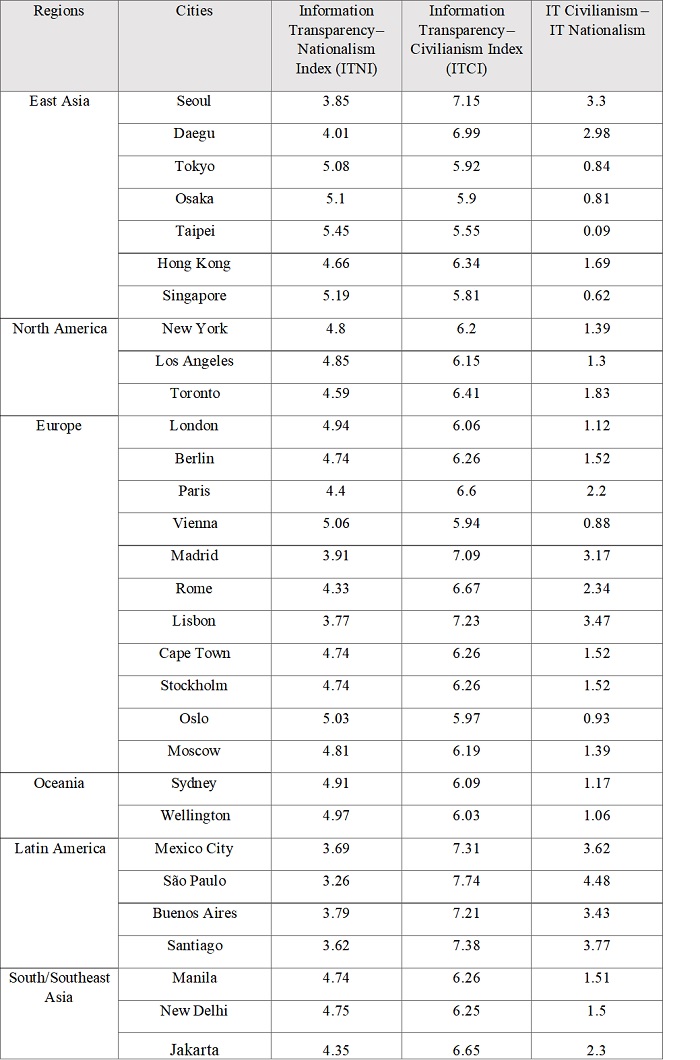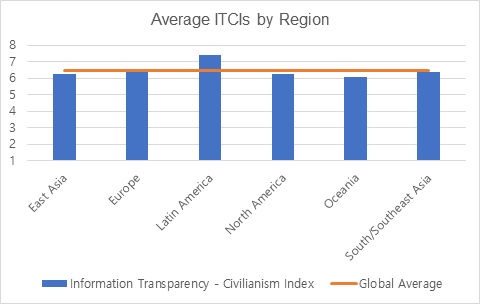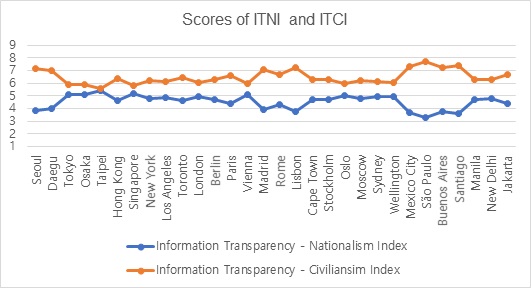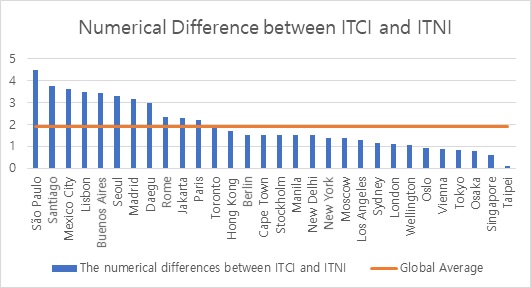Impact of Transparent Information during the COVID-19
1.
Background
COVID-19
data analysis 5 series will focus on how emergency measurements during the
COVID-19 influence the nationalism around the world. To illustrate, we will analyze
the survey results of opinions of global citizens whether they perceive a
certain policy will lead a country to nationalism or citizens’ cooperation.
International cooperation is occasionally disturbed by countries with strong
and offensive nationalism, and sometimes, even a central government cannot
control the national outrage triggered by nationalistic sentiment. Even worse,
irrational nationalism would bring about racism and xenophobia, which severely
undermines the free and open market around the globe. On the contrary,
cooperation among citizens and governments would enhance the effectiveness of
abating the crisis and it will help fast recovery from an emergency to everyday
life.
Fear
and panic may cause an unstable state of society, and therefore, sometimes a
government chooses not to release the information of an emergency and keep it
classified. At this moment, an unprecedented and extraordinary disease is
threatening the globe and an extreme volume of patients are waiting for the
cure. Facing the rapid spread of the virus, transparent and accurate
information sharing is of significance in mitigating the surge of COVID-19. For
example, Italy adopted a transparent strategy following registration of the
first COVID-19 case; the aim was to avoid unreasonable public confusion through
media or other channels. Besides, the World Health Organization (WHO) has been
providing daily updated and situation reports on the progression of the
pandemic and has provided global guidance and support.
2.
Research
Topic
In the time of the COVID-19 pandemic, it
is vital to sustaining social stability along with protecting the public health.
Information sharing may cause hoarding, stock market crash, and so on; however,
it is transparent information sharing that can check the corruption and can
quickly respond to the pandemic. In this section, we will scrutinize how global
individuals think of transparent information sharing during the COVID-19 crisis.
3.
Questionnaire
Used
Survey Question II-7: “While fighting
against a global pandemic like COVID-19, a country may begin to follow either a
state-centric and chauvinist path, or a democratic path based on citizen
participation. In terms of transparent information sharing on testing and
disinfection, what direction do you expect the following policies/trends to
take?”
The answers consist of a 10-point scale,
with higher scores indicating an individual believes the policy will lead
citizens to democratic/participatory citizenship and lower scores demonstrating
a person acknowledges the measure will result in citizens’ state-centric/chauvinistic.
4.
Major
Outcomes
Table 1: Information Transparency –
Nationalism Index (ITNI) and Information Transparency – Civilianism Index
(ITCI) by Citizens of 30 Global Cities

Respondents are asked to choose one score
to represent their ideas on the question, and the average scores of each city
indicate the Information Transparency – Civilianism Index (ITCI). It demonstrates
that citizens’ thoughts on the impact of transparent information sharing, and
the higher the score is, the more individuals believe that transparent
information will lead to civilianism of a country. Meanwhile, the reverse
scaling was used in the Information Transparency – Nationalism Index (ITNI),
which means that 11 minus ITCI is the Information Transparency – Nationalism
Index (ITNI). Similarly, the higher the ITNI score is, the more a citizen holds
that a certain policy will lead a country to nationalism. Finally, the numerical
differences between the two scores were calculated in order to show which side
a city is putting more significance. To illustrate, the higher a numerical
difference is, the more citizens of the city assumes the policy will lead people
to democratic and participatory citizenship.
Table 2: Average Information
Transparency – Civilianism Index (ITCI) by Region
|
Regions
|
Average Information Transparency – Civilianism Index
Index (1 – 10)
|
|
East Asia
|
6.24
|
|
Southeast/South Asia
|
6.39
|
|
North America
|
6.25
|
|
Oceania
|
6.06
|
|
Latin America
|
7.42
|
|
Europe
|
6.41
|
The scores in the
table are the average Information Transparency
– Civilianism Index (ITCI) of
the global citizens by region. To be specific, the lowest score of 6.06 was
rated by Oceanian citizens on average, and the highest score of 7.42 was rated
by Latin American citizens. There were various scores among distinguished areas;
nevertheless, all regions think highly of transparent information sharing
during the crisis since the scores of ITCI are higher than the middle number of
5.50.
Figure 1: Bar Graph of Average Information
Transparency – Civilianism Index (ITCI) by Region

Figure 1 is the
visualized graph of Table 2, and the orange line is the world average Information
Transparency – Civilianism Index (ITCI). That Latin American citizens think highly of the information
transparency is evidenced by the figure, and the scores are followed by Europe,
South/Southeast Asian, North American, East Asian, and Oceanian people. For
further detailed analysis, let’s see each city’s score of ITCI and ITNI.
Figure 2: Line Graph of Information
Transparency – Nationalism Index (ITNI) and Information Transparency –
Civilianism Index (ITCI)

This figure is a visualized version of
Table 1, and the most
outstanding finding of Figure 2 is that South Korea, Spain, Italy, Portugal, Mexico,
Brazil, Argentine, and Chile, represented by Seoul, Daegu, Madrid, Rome,
Lisbon, Mexico City, Sao Paulo, Buenos Aires, and Santiago, show a huge gap
between Information Transparency Nationalism Index and Civilianism Index. It means
that citizens in these countries generally regard that data transparency and
openness will engender civilianism in a society. Besides, all cities are
perceiving that transparent information has a positive effect and will draw
participation and cooperation among people.
Figure 3: Bar Graph of Numerical Difference
between Information Transparency – Civilianism Index (ITCI) and Information
Transparency – Nationalism Index (ITNI)

The differences
between ITCIs and ITNIs are drawn as a bar graph, shown in Figure 3. The orange
bar indicates the global average difference score (6.47). All cities are
presenting that accessing to transparent information will lead to global
civilianism, and a city with a bar above the orange line implying that the city
is more accenting on the information transparency, while a city with a bar
below the orange line indicating that the city is less highlighting the policy.
Nevertheless, all cities conceive that a certain policy will lead a nation in a
cooperative direction. Moreover, as shown in Figure 3, all Latin American
cities rated higher than the global average, whereas Taipei scored the lowest,
followed by Singapore, Osaka, and Tokyo, which are East Asian cities.
5.
Summaries
and Further Tasks
a.
Data
analysis shows that global citizens believe transparent information sharing
will lead a country to civilianism.
b.
Latin
American average ITCI scored highest, indicating the region is more highly
emphasizing transparent information sharing amid the crisis.
c.
The
study is limited to descriptive research, and therefore, a more detailed
explanative investigation is required to further understand the global citizens’
consciousness presented above. For instance, why citizens in South Korea think
highly of information transparency when other East Asian cities’ scores of ITCI
rated the lowest? Why Latin American and Southern European citizens are equally
underlining the information transparency? What factor makes them similar?
|